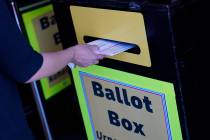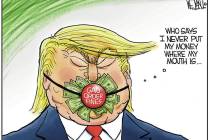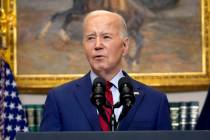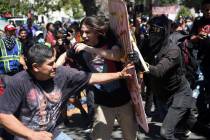‘I hereby do proclaim …’
If you want to learn about bills at the Nevada Legislature, you can readily do so by phone, Internet and even casual conversation. Resolutions, too, which unlike laws do not hold any legal effect but are thoroughly researched, recorded and publicly reported, again, are also accessible through similar means.
And then there is the strange case of legislative proclamations -- concealed from public scrutiny, yet used for public recognition and, at times, abused for political points.
Proclamations involve elected public officials making formal public declarations on behalf of the state -- bearing the seal of the state of Nevada -- crafted by state personnel over the course of several hours, signed and awarded by a publicly elected official (or several). Proclamations are inexplicably deemed a state secret.
According to Constituent Services, a division of the Legislative Counsel Bureau, there are no formal rules regarding proclamations, yet this public act is unavailable for public view and scrutiny. The LCB deemed it so. The broad nature of the language under NRS 218F.150 -- meant to exclude internal communications but not public acts -- is improperly applied to these creations of the Legislative Counsel Bureau.
NRS 218F.150 will let you know all about important travel expenses -- the cost of a breakfast at McDonald's or the Motel 6 hotel room on any given day for individual legislators, employees, even LCB staff -- but not the formal, signed official act of one or several legislators.
A proclamation is defined as both an official and public announcement to make something known to constituents.
Apparently, legislators, with the complicity of the LCB, want only the recipients of official proclamations and whatever audience they deem proper in the know. They do not want a record of them for the public to view.
How can the public properly scrutinize that which it does not have access to? Are the proclamations handed out as political favors under the guise of state secrecy for personal benefit? A proclamation is awarded on behalf of the citizens of the state at the behest of elected officials and, in turn, those same citizens have the absolute right to know.
The inception of the third-tier proclamation a few years ago made perfect sense and seemed innocuous. But like many well-intentioned political initiatives, this, too, was soon ripe for potential abuse. Nevada legislators had spent an inordinate amount of Assembly and Senate floor time on nonbinding resolutions, requiring professional staff, while state needs have increased dramatically and the tight schedule of mandated 120-day biennial legislative sessions remained the same.
But what once was available to the public as a resolution is now undisclosed to taxpayers under the guise of a proclamation. These are being handed out at an increasing rate, no longer just during the session, but year-round.
Having such a simple state act kept secret does not make sense. The full content of each resolution -- from who, to whom, content, date -- should be in full view, publicly available and open for inspection. This only adds to our state government's consistently poor ranking in government transparency.
The Legislative Counsel Bureau should not arbitrarily restrict access to public acts that were previously accessible by another name. What is there to hide? A proclamation, by practice, is a good act, so again, why the secrecy?
Las Vegas resident Martin Dean Dupalo is a political science instructor at Carrington College.























